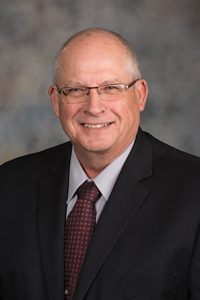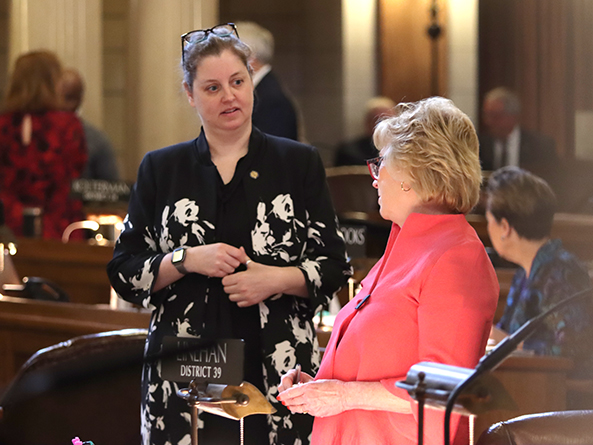Tax cut package advances to final round
A bill that includes proposed cuts to Nebraska’s top individual and corporate income tax rates advanced to final reading April 5 after a successful cloture motion.

As amended on general file, LB873, introduced by Henderson Sen. Curt Friesen, would end state taxation of Social Security income, create a new credit based on taxes paid to community colleges and ensure that a refundable state income tax credit does not fall below its current amount.
The bill also would cut Nebraska’s top individual income tax rate in several steps from the current 6.84 percent to 5.84 percent by tax year 2027. It would cut the state’s top corporate income tax rate from the current 7.5 percent to 5.84 percent by the same year.
Sen. Wendy DeBoer of Bennington introduced an amendment on select file that would reduce the rate on Nebraska’s third individual income tax bracket from 5.01 percent to 4.01 percent by the same year.
Under DeBoer’s amendment, the bracket would include taxable income between $18,000 and $28,999 for individuals and between $36,000 and $57,999 for those married filing jointly.
DeBoer said the “vast majority” of Nebraskans earn an income within that range and that LB873 would give those taxpayers little or no benefit.
Omaha Sen. John Cavanaugh supported the amendment, saying LB873 would reduce state tax revenue by approximately $900 million per year when fully implemented. Roughly $70 million of that tax cut would go to Nebraskans whose taxable income is more than $1 million.
In contrast, he said, DeBoer’s proposed cut would reduce state tax revenue by approximately $100 million per year when fully implemented.
“If it is acceptable to spend $70 million giving millionaires thousands of dollars in tax relief,” Cavanaugh said, “how can you not be in favor of giving tax relief to people working minimum-wage jobs in the state of Nebraska?”
Sen. Lou Ann Linehan of Elkhorn, chairperson of the Revenue Committee, opposed the amendment, saying a further revenue reduction would not fit within the state’s budget.
“I would love to do this,” she said, “but we don’t have the money to do this unless there’s a pay-for that nobody’s mentioned thus far.”
Albion Sen. Tom Briese also opposed DeBoer’s proposal. If it were adopted, he said, the tax package then would benefit income taxpayers more than property taxpayers, jeopardizing the bill’s passage.
“A lot of negotiation and compromise went into this to get a fair and equitable balance of income versus property [tax relief],” Briese said. “For now, we need to leave it alone.”
The amendment failed on a vote of 18-26.
Cavanaugh introduced an amendment that would cut the top individual and corporate rates to 5.99 percent rather than 5.84 percent. He said the additional revenue would allow for a tax cut similar to the one DeBoer had proposed. The amendment failed on a vote of 14-28.
Cavanaugh introduced another amendment that he said would fully implement only certain provisions of LB873, including the phaseout of taxation of Social Security income.
It would implement only the first of the incremental reductions in the individual and corporate income tax rates proposed in LB873. Cavanaugh said future lawmakers could further reduce the rates based on near-term revenue projections instead of long-term projections, which tend to be less accurate.
The second Cavanaugh amendment failed on a vote of 14-29.
After four hours of second-round debate, Friesen filed a motion to invoke cloture, which ends debate and forces a vote on the bill and any pending amendments. The motion succeeded on a vote of 43-0. Thirty-three votes were needed.
Senators then advanced LB873 to final reading by voice vote.


